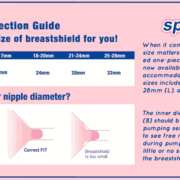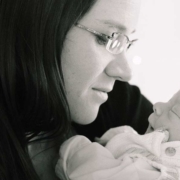To Sleep Or Not To Sleep?
by: Bonne Dunham, IBCLC, RN
That is the question that so many new breastfeeding Mothers will ask when their babies start sleeping through the night, yet their breasts are overflowing with milk.
Of course, as mothers, we spend those first few months of motherhood dreaming about the day more sleep will arrive. Yet, when that shift comes, we often start to worry about how this chunk of hours when baby is not breastfeeding will affect our milk supply. We put so much time into building and protecting that milk supply, nursing every two to three hours around the clock, even when our heart and soul and body would love to be sleeping, in the wee hours of the night. Rest assured (no pun intended!), that with a little understanding of how milk production works and adjusts to your baby’s growth and development, you can both have a sound sleep at night and plenty of milk to meet your child’s needs.
It may take a few weeks for your body/breasts to adjust to your baby’s new sleeping pattern, but it will. Initially, most women will wake to find themselves in a pool of breast milk, or hard, swollen breasts, only to find that their baby is sound asleep and not in need of a breastfeeding snack at this moment. Most women will find that they wake naturally in those first few weeks, either because of the sensation of very full breasts, or just because their body rhythm has been doing so for several weeks or months. To help your body adjust, to protect your milk supply, and reduce the risk of getting a plugged duct or mastitis, it is a great idea to relieve that pressure by pumping or hand expressing. The following tips will help you through this new stage of breastfeeding your baby.
1.) It’s ok for you to harvest a little more sleep during this transition. If you are accustomed to feeding your baby every 3-4 or so hours at night, it is fine to sleep a couple of more hours before you relieve some of that milk by pumping or hand expression. Keep in mind that going longer than 4-5 hours does result in the milk making hormone (prolactin) to lower in your blood which can result in less milk produced. What you remove from your breasts is what you will make. So, ultimately when you stop nursing or pumping at night your body starts the weaning process.
2.) To help your body make this adjustment to producing less at night, you need only to express milk until your breasts are soft if your baby is not nursing during this time. Often, this looks like about 2-5 minutes of expression. Longer than this time does result in elevating your amazing milk making hormones to continue to produce. Remember, after just two to three weeks of doing this, you will likely not experience swollen or leaking breasts at night, and can, therefore, stop expressing and start sleeping!
3.) Babies are amazing creatures, and will adjust themselves by either nursing more frequently during the day, or taking in more milk per breastfeeding session. Starting around 3-6 weeks postpartum, babies drink an average of 30 ounces of milk per day, right up until solids are introduced. This average doesn’t really change much during those months, however, babies do become more efficient feeders as they grow, taking in more ounces per feed, and may space the feedings out depending on their needs.
4.) It is wise to keep a watchful eye on your baby and your perception of your milk supply as you make this adjustment to less breastfeeding at night. If you suspect that your milk supply has decreased, there are ways to balance it out during your waking hours. You may benefit from speaking to a lactation consultant about your concerns, or to get extra stimulation on your breasts from a daily pumping session.
5.) You got this!!!
If you missed the Live Q&A, don’t worry! We got you covered.
…Sweet Dreams










Leave a Reply
Want to join the discussion?Feel free to contribute!